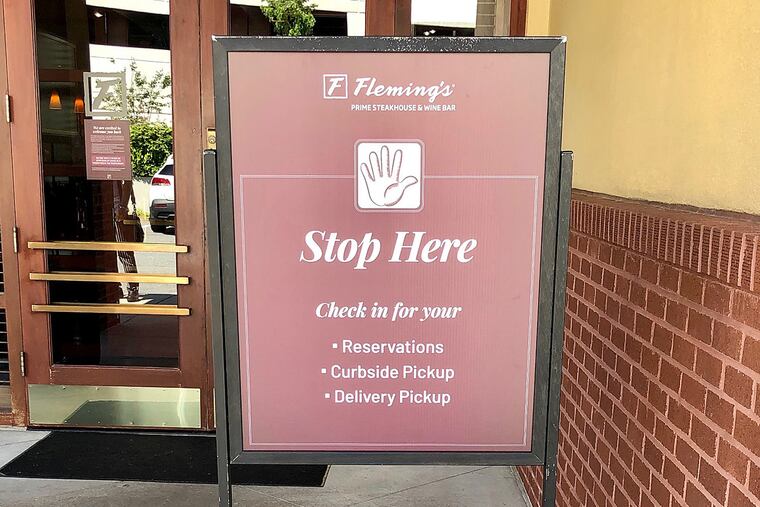What it’s like to dine at a restaurant that reopened during coronavirus
The Fleming’s Prime Steakhouse in Dunwoody, Ga., which reopened last weekend, has fewer seats and more sanitation.

Dining rooms in three states began to reopen last week after more than a month of shutdowns to curb the coronavirus pandemic.
Governors in Georgia, Tennessee, and Alaska are attempting a high-wire act, balancing a restart of the economy against calls to protect staff and patrons from the virus.
Still, most restaurateurs — a cross-section of the industry including fast-food chains McDonald’s and Chick-fil-A, as well as fancier, chef-driven independents — have demurred, saying more safety measures need to be in place before they greet and seat customers.
It’s a hot-button issue in Atlanta, where a coalition of 120 restaurateurs under the name #GAHospitalityInitiative is refusing to reopen.
Among the restaurants that did reopen last week was the Fleming’s Prime Steakhouse in Dunwoody, Ga., an Atlanta suburb.
Fleming’s, a high-ticket restaurant owned by Tampa-based Bloomin’ Brands, plans to reopen locations only in areas that executives believe are not hot spots for the coronavirus, spokesperson Elizabeth Watts said. Bloomin', whose brands also include the more casual Outback Steakhouse, Carrabba’s Italian Grill, and Bonefish Grill, will restart six Fleming’s locations in Florida this week. Two in South Florida, which has more confirmed coronavirus cases, will remain closed, she said.
» READ MORE: Philly-area restaurant owners are planning a ‘hard reset’ for reopening during coronavirus
The Fleming’s in Dunwoody could have opened April 27 when Georgia Gov. Brian Kemp lifted shelter-in-place directives. But the company waited until May 1 to better outline a plan for reconfiguring the dining room and to implement safety measures, said Patrick English, Fleming’s Philadelphia-based senior director of operations, who oversaw the reopening in person.
During the shutdown, the location had been offering food for delivery and curbside pickup — a new line of work for the white-tablecloth operation. "This seems to be a sustainable business model for us,” English said. It will remain even as dine-in customer counts rise.
When the reopening became real, “we reached out to everyone to make sure that they were comfortable to come back to work,” English said. “We didn’t have anyone who didn’t want to come back. It was a question of how we could weave them into the fabric of the schedule.”
Fewer customers mean fewer front-of-house staff, but the kitchen staff is now growing with the dining room open.
Dinner business last weekend was evenly divided between the dining room and pickup and delivery. About 90 dinner patrons were served in the dining room Friday, and 108 Saturday, English said. Overall, the restaurant’s customer count was lower than during a typical May weekend.
Georgia dining rooms are now limited to 50% of seating. English said Fleming’s was “going a little further" than guidelines. The 230-seat Dunwoody location was operating at just 35% to 40% of seating, or about 25 tables, he said.
“They say tables must be spaced six feet apart,” English said. “We’re doing eight feet to create a buffer. I really want to err on the side of how our guests are feeling. They trust us and are confident in who [we] are and what we’re doing.”
The bar has not reopened because of the challenges of maintaining social distance with bar seating.
» READ MORE: Reopening businesses during coronavirus is complicated: ‘I’m so afraid of letting anybody in the place’
Customers wait outside, some in their cars, until their tables are ready. An employee outside the door directs them inside and they are ushered directly to their tables. Waiters wear plastic gloves and masks. Masks are optional for customers. Silverware is rolled up in napkins and brought to the tables. The menus, which include about 70% of the usual items, are disposable. Customers also can scan a QR code and view them on their phones.
“They were very appreciative of the measures that we’re taking," English said of Fleming’s, which also has locations in Radnor and Marlton.
English noticed that it took two hours for a party of two to dine, opposed to 90 minutes, because people were enjoying themselves. He also saw increased wine and liquor sales. “I think people are just enjoying being out,” he said.
» HELP US REPORT: Are you a health care worker, medical provider, government worker, patient, frontline worker or other expert? We want to hear from you.